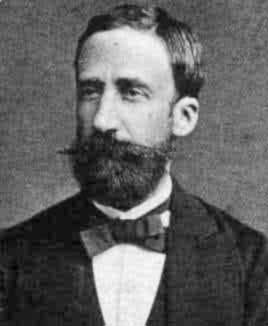


 تاريخ الرياضيات
تاريخ الرياضيات
 الرياضيات في الحضارات المختلفة
الرياضيات في الحضارات المختلفة 
 الرياضيات المتقطعة
الرياضيات المتقطعة
 الجبر
الجبر
 الهندسة
الهندسة 
 المعادلات التفاضلية و التكاملية
المعادلات التفاضلية و التكاملية 
 التحليل
التحليل
 علماء الرياضيات
علماء الرياضيات |
Read More
Date: 2-2-2017
Date: 16-1-2017
Date: 18-1-2017
|
Died: 5 March 1927 in Vienna, Austria

Franz Mertens' father was Julius Mertens and his mother was Henrica de Malignon. He was born into a partitioned Poland, the third of the three partitions took place in 1795 and split Poland between Russia, Prussia and Austria. Sroda, the village in which Mertens was born, was close to Poznan in Prussia. The district had a long history of a mixed German and Polish population, but after it was annexed to Prussia there were further attempts to increase its German nature. Mertens' family naturally identified with the German aspect of the country while for those of Polish culture the years of the 19th century were a continual battle to struggle for their identity. He was known, however, both by the German version of his name which is Franz and the Polish version which is Franciszek.
Mertens completed his university studies at the University of Berlin where he attended lectures by Weierstrass, Kronecker and Kummer. This was the "golden period" for mathematics in Berlin and gave Mertens the best possible mathematical foundations. In 1865 he obtained his doctorate with a dissertation on potential theory De functione potentiali duarum ellipsoidium homogenearum. His advisors had been Kummer and Kronecker.
He worked first in the Jagiellonian University at Cracow, at this time part of the Austrian region of Poland, being appointed as an extraordinary professor in 1865, then promoted to an ordinary professor in 1870. He was called to the Polytechnic in Graz in Austria in 1884 then, remaining in Austria, from 1894 he was an ordinary professor of mathematics at the University of Vienna. He retired in 1911 but, being made Professor Emeritus, he continued to give lectures. He supervised the doctoral theses of a number of excellent mathematicians while in Vienna, in particular Ernst Fischer who received his doctorate in 1899, and Eduard Helly who was awarded his doctorate in 1907. He also lectured to Schrödinger in mathematics at around the same time. It is worth noting that, in 1882, Mertens was offered the chair at Halle left vacant after the death of Heine. He had been the third choice for this chair but after Dedekind and Heinrich Weber turned it down, Mertens (who was at that time in Cracow) also turned it down.
Mertens worked on a number of different topics including potential theory, geometrical applications to determinants, algebra and analytic number theory, publishing 126 papers. Bruce C Berndt writes:-
Mertens is perhaps best known for his determination of the sign of Gauss sums, his work on the irreducibility of the cyclotomic equation, and the hypothesis which bears his name.
Many people are aware of Mertens contributions since his elementary proof of the Dirichlet theorem appears in most modern textbooks. However he made many deep contributions including Mertens' theorems, three results in number theory related to the density of the primes. He proved these results using Chebyshev's theorem, a weak version of the prime number theorem. Merten's conjectures appears in his paper Über eine zahlentheoretische Funktion (1897) published in Akademie Wissenschaftlicher Wien Mathematik-Naturlich Kleine Sitzungsber. Here Mertens defines M(n) to be the sum of the numbers m(i) where i runs from 1 to n and where m is the Möbius function. It was known that there is no x with M(x) > x but Mertens' conjecture was stronger, namely that there is no x with M(x) > √x. The result is important since a proof of Mertens' conjecture would imply the truth of the Riemann hypothesis. The conjecture stood for nearly 100 years before it was proved false in 1985 by A M Odlyzko and H J J te Riele.
Among Mertens other papers we mention: Invariante Gebilde ternärer Formen (1887); Invariante Gebilde quaternärer Formen (1889); Dirichletscher Reihen (1895); Zur linearen Transformation der q-Reihen (1901); and Beweis der Galois'schen Fundamentalsatzes (1902).
Books:
Articles:



|
|
|
|
مخاطر عدم علاج ارتفاع ضغط الدم
|
|
|
|
|
|
|
اختراق جديد في علاج سرطان البروستات العدواني
|
|
|
|
|
|
|
مدرسة دار العلم.. صرح علميّ متميز في كربلاء لنشر علوم أهل البيت (عليهم السلام)
|
|
|